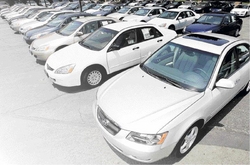Used-car imports collapse - New-car dealers want duties slashed
Published: Wednesday | March 11, 2009

Used-car imports have collapsed under pressure from the global recession, striking a major blow to the industry which suffered a more than tenfold decline in year-over-year monthly stock imports in January, its biggest tumble ever.
Industry players are now bracing for further fallout in the face of sales nosediving 50 per cent.
At the same time, importers of new motor vehicles are reporting a 60 per cent drop in sales, a reality that has led them to press the Government to slash import duties in a last-ditch attempt to stimulate flagging demand.In January this year, a mere 140 pre-owned vehicles were imported from Japan, the major source of used-car imports into Jamaica, compared to more than 1,500 units brought in during the first month of 2008. This represents a whopping 91 per cent contraction, as dealers put the brakes on building up inventory in a market characterised by sluggish sales.
"It is the worst I have seen it," said Andrew Jackson, former president of the Jamaica Used Car Dealers Association (JUCDA), and chairman of Jetcon Corporation, a leading used-car dealer. He was commenting on the precipitous drop in stock imports.
"The lowest sales imports have ever been is about 600 to 700 vehicles. It has never, ever been that low." It has got significantly worse in weeks and months. "Motor car sales throughout the world are down," he added, pointing out that the situation has scuttled any possibility of new investments in that line of business.
"Just like everybody else, sales are down, way down 40-50 per cent and we are currently struggling to survive. In times of crises like these, people tend to delay major investments."
These sentiments are echoed by the current JUCDA president, Kenneth Shaw: "Dealers who use to sell 30-plus vehicles on a monthly basis are now selling two and three. Some have diversified operations, gone into servicing, but even that has reduced. Car owners are now coming to buy the disc pads and engine oils and servicing their cars themselves."
Other factors
In addition to the general downturn in the business globally, Shaw is fingering other factors as contributing to the dire situation facing his line of business.
"The revaluation of the yen against the US (dollar), which has pushed up the prices, and the devaluation of the Jamaican dollar. The collapse of unregulated investment schemes, such as Cash Plus, Olint and WorldWise, as well as the redundancy and layoffs have added to it," he said.
According to Shaw: "People are unsure where they are going, what they are doing and this impacts significantly on consumer confidence and how they spend. Everybody now wants to wait and see before they make the investment, but they are uncertain if they should proceed."
Dramatic decline
Like the used-car business, Jamaican importers of new motor vehicles are reporting a 60 per cent drop in February sales over last year's monthly average, according to Kent LaCroix, head of the Automobile Dealers Association (ADA).
"There has been a dramatic decline in sales, from 500 vehicles a month on average in 2008, except for November and December, when the decline began," LaCroix told Wednesday Business. "We have seen a little over 300 vehicles being sold in January and a further decline to 200 for February."
LaCroix is familiar with the plight of his colleagues in the used-car sector.
"One cannot even say that it is because they are buying used vehicles because sales are also down with used cars as well. People are spending money to repair their cars instead of buying new ones."
The new-car dealers are now putting the finishing touches to a petition to the finance ministry seeking help for the sector, whose members are also troubled by too much inventory on their hands. A meeting with government representatives is also scheduled for next week, at which time the car traders are expected to hear if they have been successful in their bid for reduced import duties, which they intend to pass on to buyers.
"Our association, along with the Government, is seeking to see how we can make some inroads into reducing the cost of the vehicles that we have, because currently we have about 2,500 vehicles in bond," he explained. Bonded facilities are locations where vehicles are stored, having been cleared from the wharf and no duty is paid until the vehicle is actually sold.
Feeling the pinch
LaCroix points out that both the dealers and the Government are feeling the pinch from the drastic downturn in business.
"The Government is not getting any duty. The dealers are not getting the sales. The vehicles are just sitting there. We are not getting any support from the manu-facturers, because they have already been paid and we can only drop the margins so far."
The banks are still willing to lend for new car acquisitions, the ADA president said, adding that the association was encouraged by this to drop care prices and entice buyers.
"We still have the support of the financial institutions. They welcome the effort that we are making. They do have money to lend and are willing to do so, so it is just for us to be able to re-energise the customers to respond to any reduction we succeed in getting."
It is yet to be seen whether these attempts will bear fruit. Only this week news emerged that, despite their offers of deeper discounts, automakers in the United States were still unable to lure American shoppers into showrooms in February, with vehicle sales falling to their lowest level in 28 years. There the industry sales plummeted 41 per cent from February of last year.
mark.titus@gleanerjm.com



( L - R ) LaCroix, Shaw, Jackson
















